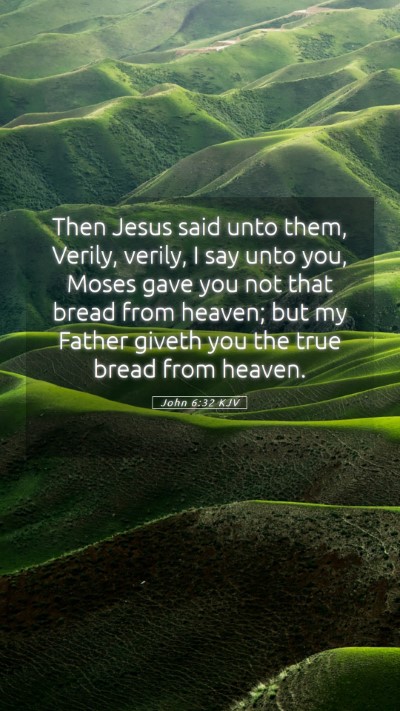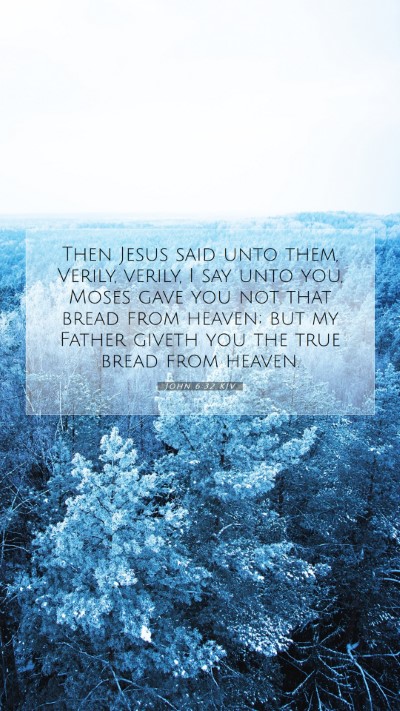Understanding John 6:32: A Comprehensive Bible Verse Commentary
John 6:32 reads: "Then Jesus said to them, 'Most assuredly, I say to you, Moses did not give you the bread from heaven, but My Father gives you the true bread from heaven.'" In this verse, Jesus draws a distinction between the manna provided in the wilderness during the time of Moses and the spiritual sustenance He offers, which comes from God. This commentary combines insights from established public domain commentaries to provide an in-depth understanding of this significant passage.
Contextual Background
This verse is situated in a larger narrative where Jesus has just performed the miracle of feeding the five thousand, and the crowd is seeking Him for more physical bread. Understanding the historical and cultural context of this interaction is essential for interpreting its deeper meanings.
Key Insights from Commentators
- Matthew Henry: Matthew Henry emphasizes that Jesus is the true bread, contrasting the temporary satisfaction provided by physical food with the everlasting sustenance He offers. He notes that the manna was a sign to the people, pointing them towards the greater reality of Christ.
- Albert Barnes: Barnes highlights the importance of recognizing that while Moses was the mediator of the old covenant and God's provision in the wilderness, Jesus is the ultimate fulfillment of that provision as the bread of life. He underscores that the nourishment Jesus provides is spiritual, unlike the physical bread given in the past.
- Adam Clarke: Clarke discusses the significance of the phrase "from heaven," suggesting that the bread Jesus offers is divine and essential for eternal life. He stresses that acknowledging Jesus as this bread is vital for true spiritual fulfillment.
Theological Significance
In John 6:32, Jesus is clarifying that, unlike the manna which was physical and temporary, the bread from His Father is permanent and life-giving. This distinction is crucial for understanding Jesus' role as the Messiah and the fulfillment of God’s promise to humanity. The verse encapsulates several key themes in biblical theology:
- Divine Provision: This verse serves as a reminder that God continues to provide for His people, but in a more profound and spiritual way through Christ.
- Spiritual Nourishment: Jesus's metaphor of bread emphasizes the necessity of spiritual sustenance in our lives, urging believers to seek Him as their source of life.
- Messianic Fulfillment: By identifying Himself as the true bread, Jesus positions Himself as the fulfillment of Old Testament prophecies regarding the coming of a Savior.
Application in Daily Life
For individuals engaging in Bible study groups or participating in online Bible study, John 6:32 prompts several applications:
- Seek Spiritual Nourishment: This verse challenges believers to prioritize their spiritual appetite over physical desires, reminding them to seek Jesus daily.
- Recognize Jesus's Role: Understanding Jesus as the source of true life transforms how believers interact with the world and prioritize their spiritual journeys.
- Embrace the Bread of Life: Reflecting on the significance of Jesus as the bread from heaven can lead to deeper worship and appreciation for the sacrifice He made.
Related Scripture References
- Exodus 16:4: The provision of manna in the wilderness as God’s physical sustenance for His people.
- John 6:48: "I am the bread of life," where Jesus clearly states His identity and purpose.
- Matthew 4:4: "Man shall not live by bread alone, but by every word that proceeds from the mouth of God," highlighting the importance of spiritual over physical sustenance.
Conclusion
In summary, John 6:32 presents a rich theological truth that invites believers to grapple with the meaning of Jesus as the true bread from heaven. Through Bible verse interpretations and insights from esteemed commentaries, we gain an understanding of the profound implications this verse has for our lives and faith. As we delve into such scriptures, we find not only knowledge but a deeper relationship with the Living Bread that sustains our souls.


